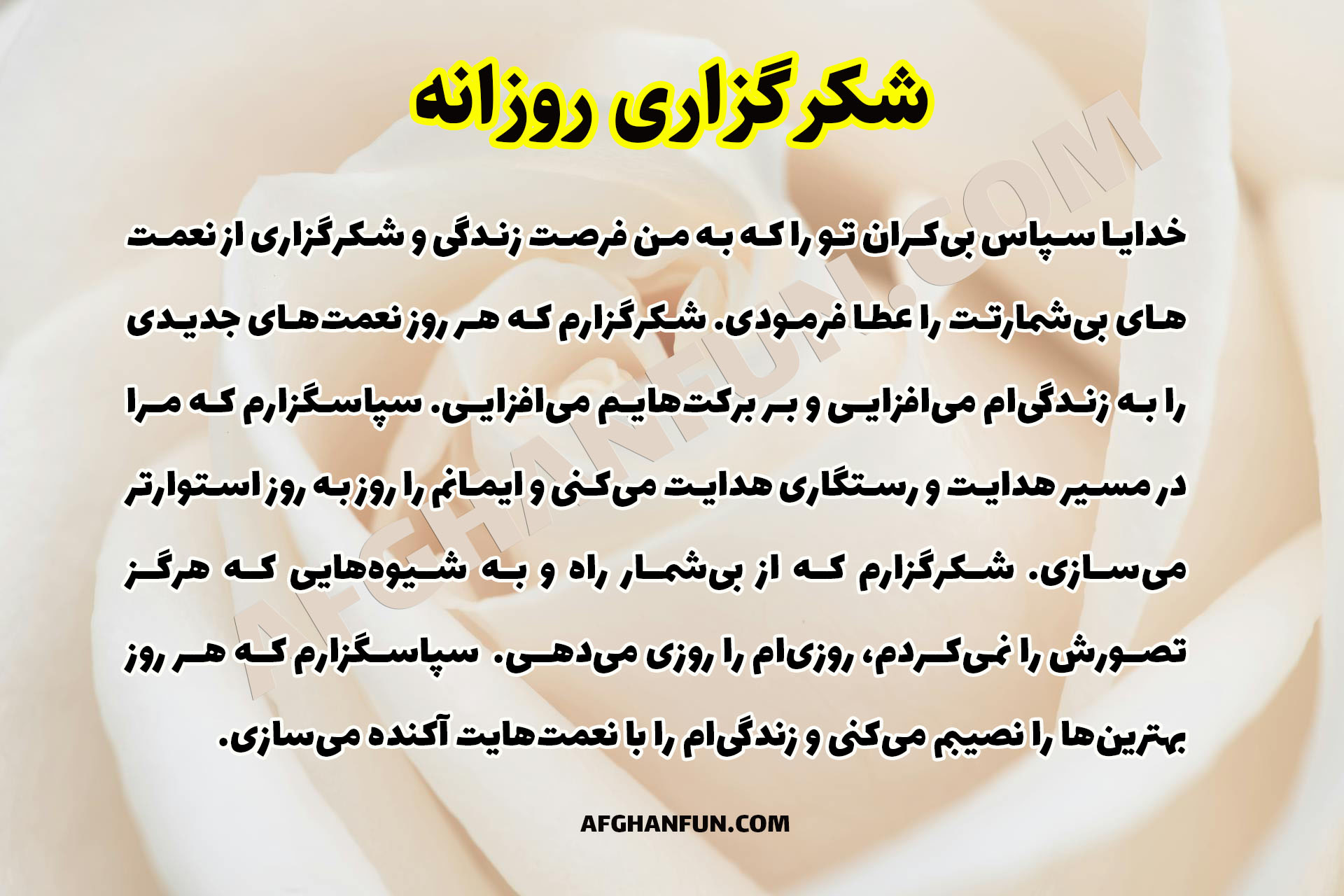
Almighty God, I offer my profound gratitude for the gift of life and the privilege of acknowledging Your infinite bounties. Thank You for Your daily provision of new blessings and for the constant increase of my prosperity. I am grateful for Your divine guidance that leads me towards righteousness and strengthens my faith. Thank You for Your miraculous provision, surpassing all my expectations. Thank You for enriching my life with Your abundant grace.
خدایا سپاس بیکران تو را که به من فرصت زندگی و شکرگزاری از نعمتهای بیشمارتت را عطا فرمودی. شکرگزارم که هر روز نعمتهای جدیدی را به زندگیام میافزایی و بر برکتهایم میافزایی. سپاسگزارم که مرا در مسیر هدایت و رستگاری هدایت میکنی و ایمانم را روز به روز استوارتر میسازی. شکرگزارم که از بیشمار راه و به شیوههایی که هرگز تصورش را نمیکردم، روزیام را روزی میدهی. سپاسگزارم که هر روز بهترینها را نصیبم میکنی و زندگیام را با نعمتهایت آکنده میسازی.
Эй Худои меҳрубон, барои ин ҳаёти пурбаракат ва имконияти шукргузорӣ аз неъматҳои бешуморат Иҷодат, ба Ту бениҳоят миннатдорам. Барои он ки ҳар рӯз неъматҳои нав ба ҳаётам меоварӣ ва баракатҳоямро зиёд мекунӣ, аз Ту сипосгузор ҳастам. Барои он ки маро дар роҳи ростӣ роҳнамоӣ мекунӣ ва имонамро рӯз ба рӯз мустаҳкамтар месозӣ, аз Ту сипосгузор ҳастам. Барои он ки аз роҳҳои бешумор ва ба тарзҳое ки ҳеҷ гоҳ тасаввурашро намекардам, рӯзиямро меравӣ, аз Ту сипосгузор ҳастам. Барои он ки ҳар рӯз беҳтаринҳоро насибам мекунӣ ва ҳаётамро бо неъматҳоят пур месозӣ, аз Ту сипосгузор ҳастам.
اللهم لك الحمد والشكر على نعمة الحياة وفرصة الشكر على نعمك الكثيرة. أشكرك على إضافتك نعم جديدة إلى حياتي كل يوم وزيادة بركاتي. أشكرك على هدايتي إلى الصراط المستقيم وتقويتي إيماني يوماً بعد يوم. أشكرك على رزقي من حيث لا أحتسب. أشكرك على ملء حياتي بنعمك كل يوم.
This gratitude is beautifully written, and it captures several key elements that make it a powerful, spiritually resonant expression of thanks. Here’s a deeper analysis of its components:
1. Invocation of the Divine (Almighty God)
- By addressing God as “Almighty,” the gratitude begins with a profound acknowledgment of divine omnipotence. This sets the tone, creating a sense of reverence and humility. The phrase implies a recognition that God is all-powerful and capable of providing for all human needs, not just physically but spiritually as well.
2. Recognition of the Gift of Life and Gratitude for Awareness
- “I offer my profound gratitude for the gift of life” goes beyond mere thanks; it suggests an appreciation for existence itself, a central element of spiritual gratitude. The phrasing “the privilege of acknowledging Your infinite bounties” also implies that being aware of and able to recognize God’s gifts is itself a privilege. This line acknowledges the human role in perceiving blessings, suggesting that gratitude is a chosen, mindful response.
3. Daily Blessings and Provision
- “Thank You for Your daily provision of new blessings” focuses on the continual nature of God’s support. This highlights the everyday nature of divine blessings, suggesting that gratitude isn’t a one-time feeling but a continuous, daily act. The phrase acknowledges that blessings are renewed daily, evoking the idea of perpetual abundance and the unwavering faithfulness of God in providing for one’s needs.
4. Gratitude for Prosperity and Increase
- By thanking God “for the constant increase of my prosperity,” there is an appreciation for both material and spiritual growth. This gratitude reflects the acknowledgment that prosperity is not static; it is a dynamic, evolving state that God continues to nurture. This may suggest that prosperity goes beyond wealth, potentially including health, relationships, personal growth, and spiritual abundance.
5. Divine Guidance Towards Righteousness and Strengthening of Faith
- “I am grateful for Your divine guidance that leads me towards righteousness” appreciates God’s moral direction, acknowledging that divine influence helps the speaker align with higher ethical or spiritual standards. The gratitude for faith strengthening implies a reliance on God for spiritual resilience, recognizing that faith is not solely self-generated but supported by divine help.
6. Miraculous Provision Surpassing Expectations
- “Thank You for Your miraculous provision, surpassing all my expectations” is a powerful line that expresses a sense of awe and wonder at the generosity of God’s gifts. By calling this provision “miraculous,” the statement acknowledges that God’s blessings are often unexpected and exceed ordinary means, suggesting a divine touch that surpasses human planning or effort.
7. Enrichment through Abundant Grace
- “Thank You for enriching my life with Your abundant grace” completes the gratitude with a sense of fullness and abundance. Grace here represents unconditional love and support, given without requirement or effort on the receiver’s part. Recognizing grace as enriching acknowledges that life itself is made fuller, richer, and more meaningful because of this divine generosity.
Overall Tone and Structure
The prayer is structured as a series of acknowledgments, with each phrase building on the last. The language is humble, affirming the speaker’s role as a recipient rather than a deserving or entitled person. The tone is reverent and humble, a common feature of gratitude rooted in spirituality, as it reinforces the feeling that everything—from life itself to prosperity and grace—is a gift beyond the speaker’s control.
Theological Implications
In theology, gratitude to God often includes recognizing Him as the ultimate source of all goodness. This gratitude does just that, affirming a theology of abundance, guidance, and miraculous provision. It reflects a worldview where God is seen not only as a creator but as a sustainer, intimately involved in both the grand and mundane aspects of life.
Psychological and Emotional Impact
Expressing gratitude in this manner can have profound psychological benefits, cultivating a sense of well-being, humility, and resilience. Acknowledging divine guidance and provision reduces the focus on personal efforts alone and can foster a sense of peace and trust. By focusing on daily blessings and miraculous provision, it centers attention on the positive, which is often helpful for mental and emotional balance.
Conclusion
This gratitude is a deeply layered expression of thankfulness, weaving together recognition of life, prosperity, faith, and divine guidance. It stands as a reminder of the fullness of God’s gifts and the speaker’s dependence on divine providence. Through its expressions, it nurtures a sense of humility, contentment, and alignment with spiritual values, making it both a personal and a universal articulation of gratitude.











